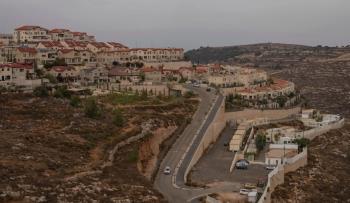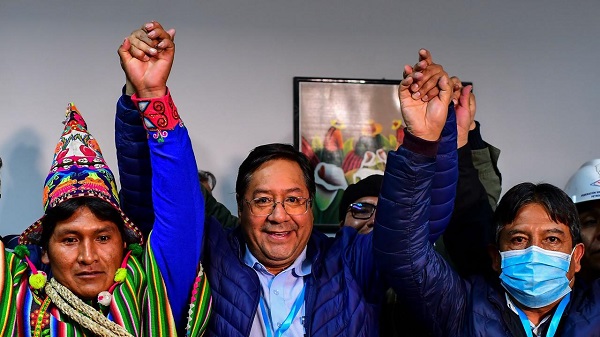Alwaght- Luice Arce, Bolivian Movement towards Socialism (MTS) candidate and a close ally to the former President Evo Morales, has won the presidential election in the country by securing 52 percent of the votes in what is seen by many as another defeat to the US that has pushed to uproot the anti-imperialism stream in the Latin American nation.
Local media reported the news and said that Arce is the certain winner of the vote and that there would be no runoff. Further reports said that Arce, who was minister of finance under Morales, was 20 percent ahead of his rival Carlo Mesa, former president and leader of the Civil Solidarity Union.
Mesa, who also made a serious rival to Morales in the previous election, has now reportedly secured only 31.5 percent of the votes.
Therefore, only a year after the resignation of Morales, who was accused by the opposition leaders of vote-rigging in the 2019 presidential elections, the country is witnessing the comeback of the leftists and a known figure of the MTS party.
The victor of the vote in his initial comments after the election commission statement said that Bolivia once again was reunited with democracy.
Arce, talking to the journalists, said that “we will work for all of the Bolivians and will form a national unity government.”
According to the TeleSur news network, Luis Fernando Camacho, candidate of We Believe Coalition has secured only 14.1 percent.
Controversial elections
The Saturday elections in the Latin American state came a year after 2019 controversial elections that were followed by a coup that led to the resignation and exile of Evo Morales, the only indigenous president of Bolivia.
Earlier, Morales vowed that if Arce wins the election, he would immediately return home.
The elections have been delayed twice due to the coronavirus crisis. After last year’s coup, the conservative Senator Jeanine Anez assumed the power. In January, she announced her resignation, however.
The rival party congratulates the anti-American party
Upon the statement of the vote results, Anez who is leading the US-sponsored rival party congratulated victory to the Socialist candidate Arce.
On her Twitter page, Anez wrote: “We do not yet have an official count, but from the data we have, Mr. Arce and Mr. Choquehuanca have won the election. I congratulate the winners and ask them to govern with Bolivia and democracy in mind.”
Termination of coup
Luice Arce is winning the election while only a year separates the country from the previous presidential election in which Morales won the fourth consecutive term. Washington as a backer of the rival side did not recognize the result. On the heels of the results publishing, a Washington-based group, dubbed Organization of American States, called the outcome “fraudulent” and made claims about election fraud. On November 10, with pressure from the army chief General William Kalman, Morales resigned and took refuge in Mexico. Then Anez, the Evangelist politician, announced her presidency over Bolivia addressing the Senate a majority of whose seats were empty.
The government of Anez over the past 11 months did much to suppress the supporters of Morales using military force and religious intolerance. In the predominantly indigenous city of Cochabamba in central Bolivia, the army troops attacked protestors with assault rifles, killing 9 people and injuring over 100 others.
Valeria Silva, a former congresswoman who is now in Mexican exile, said that the establishment of the government of Anez is marked by the blood of the Bolivians. Death, prison, suppression, and prosecution of the political opposition are the essential icons of a regime of terror.”
After a year, the opponents of Morales have not given any credible and acceptable evidence that Morales won the 2019 election with fraud. Jack Williams and John Corrill, in March in an article published by the Washington Post, said that there were valid pieces of evidence that prove wrong the claims made by the Organization of American States about election rigging in the Bolivian presidential elections.
“There is not any statistical evidence of fraud that we can find — the trends in the preliminary count, the lack of any big jump in support for Morales after the halt, and the size of Morales’s margin all appear legitimate. All in all, the OAS’s statistical analysis and conclusions would appear deeply flawed,” the two analysts and MIT researchers wrote.
Anez who was planned to hold the elections in September, made a huge effort to again delay the elections under the excuse of the coronavirus outbreak but faced civil resistance forcing her to hold the election with a month delay.
Morales’s return to the politics
The election results have shown that the leftwing party and the very person of Morales remain of strong political and social base despite efforts by the interim president to isolate them.
Morales, the socialist leader of Bolivia and a friend to Cuba and Venezuela governments, has had full influence on the election despite living in exile. He threw his weight behind Arce. The current results show that last year’s election was healthy and the US-supported right-wing politicians plotted the coup just because they lost the election.
Now after a year, it remains to see if after a year of ups and downs the Bolivian nation can determine its fate and future away from any intervention and violent actions of the coup plotters and the opponents of Morales and his friends.
The interim government, took control of the country with support from the military commanders and the US, has so far tried to interrupt the political activism of Morales and his party’s supporters.
Morales, the anti-American politician of Bolivia, won the presidential election first in 2005. During his rule, the US put pressure on the country nonstop, and with its heavy media campaigns blamed the economic crisis on Morales and his pro-independence agenda. Finally, the US embassy in La Paz last year practically orchestrated the coup against the president. Arranging protests against the result of the election, the Americans destabilized Bolivia and dragged it to the brink of civil war. As a result, Morales was forced to leave the country.
On Sunday, in an election deemed by the West a referendum on Morales, his ally and finance minister won the election with more than 50 percent leaving behind the American-advocated candidate. Now here is a question: Why did the people again say yes to Morales and not fall in the American trap despite 14-year economic pressures and massive media campaigns blackening the popular president’s image?
The answer is that Morales nationalized Bolivia’s oil and gas resources and stood in the face of American bullying. Besides, the GDP from 2005 to 2019 grew 4.5 percent, the poor population fell to 17 percent from 36 percent, and the per capita income grew to $3,500 annually from $1,000. His government also distributed 54 million acres of farming lands among the poor and built thousands of schools, hospitals, and clinics for them. The deprived layers of the society tangibly sensed the influences of Morales policies on their lives during the past 14 years.



























